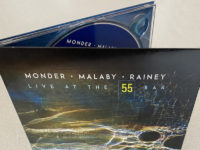Feature photo courtesy of Tom Grant
Note: stream above is from un-remastered original vinyl version of album, and is titled “The Big Man,” not “Beach Ball Tango.”
About a year after drumming icon Tony Williams recorded some tracks with a mythical trio that mostly didn’t see the light of day until decades later, he recorded an entire album, again in a trio, that somehow evaded wide release. Until now.
Play or Die (July 22, 2022, M.I.G. Music GmbH) is an important new entry into the discography of Tony Williams 25 years after his premature death at the age of 51, one that slots chronologically in the seven-year gap between 1978’s all-star affair The Joy of Flying and 1985’s acoustic straight-jazz outing Foreign Intrigue.
The album came together shortly after Williams revamped his touring band at the time, which included keyboardist Tom Grant. Grant successfully lobbied for bassist/keyboardist Patrick O’Hearn, who was between his well-known stints in Frank Zappa’s band and co-founder of the New Wave group Missing Persons. The Williams/Grant/O’Hearn trio is the short-lived ensemble that went into a studio in Stuttgart to quickly lay down tracks for five Williams originals. Released in West Germany later in 1980, Play or Die was inexplicably limited to only 500 vinyl pressings. Williams’ new trio quickly went on tour, and with no apparent effort made for wide release, Play or Die was quickly forgotten.
M.I.G. enlisted Johannes Scheibenreif to digitally remaster the 1980 recordings and he does a very commendable job, injecting some freshness into those very of-the-period analog keyboards and puts Williams’ drums about right where it should be in the mix.
The keyboard-heavy sound easily places it in the late ’70s/early ’80s sonic style, with some nods to Joe Zawinul. But Weather Report never had a drummer like Tony Williams and he dominates like the boss basher that he was. “The Big Man” could have been at home on a late ’70s WR album, with its electrified swing, but Williams’ ride cymbal frequently punctuated by tom fills and cymbal crashes are just a couple of approaches he used to make a direct connection from jazz to rock.
A cymbal-rich backbeat pervades “Beach Ball Tango,” turning into a gallop for the bridge; either time it’s a wonder that kind of drumming can be done by one person. Grant shows good chops with his Rhodes soloing after which Williams himself lays down a showstopping drumming exhibition.
Williams’ tom-toms get worked out on “Jam Tune,” with glistening synths taking the edge off. “Para Oriente,” which previously appeared in the aforementioned Trio of Doom, is crisper here; John McLaughlin’s guitar parts are replaced with keyboards but Hearn does his best Jaco Pastorius that falls into a walking bass line for the middle jazz section.
The final tune “There Comes A Time” is from the 1971 Lifetime disc Ego that featured his vocals then and does so again here. Stripped of its original psychedelia and replaced with Grant’s brighter, electric piano chords, this version might lack some of the edge but once Williams is done singing, he turns his swing into a minor tour-de-force, combining muscularity with elegance.
It’s truly remarkable that Play or Die had been effectively cryovac’ed and kept in a freezer all these years. Much as Herbie Hancock in the same year made a quality final glance back to his best fusion tendencies of the ’70s (Mr. Hands), Williams likewise made one last ‘Lifetime’ record before capitulating to the movement back toward acoustic jazz and reeling off a string of straight ahead (albeit quite good) jazz records that defined nearly all of his remaining recorded output up to his death in 1997. Unlike Trio of Doom, Play or Die is much more than a curiosity, it’s a legit statement on fusion jazz from one if its originators.
- Christian Marien Quartett – ‘How Long Is Now’ (2024) - April 18, 2024
- Dave Douglas, feat. James Brandon Lewis – ‘Gifts’ (2024) - April 11, 2024
- Thollem – ‘Worlds In A Life, Two’ (2024) - April 8, 2024




